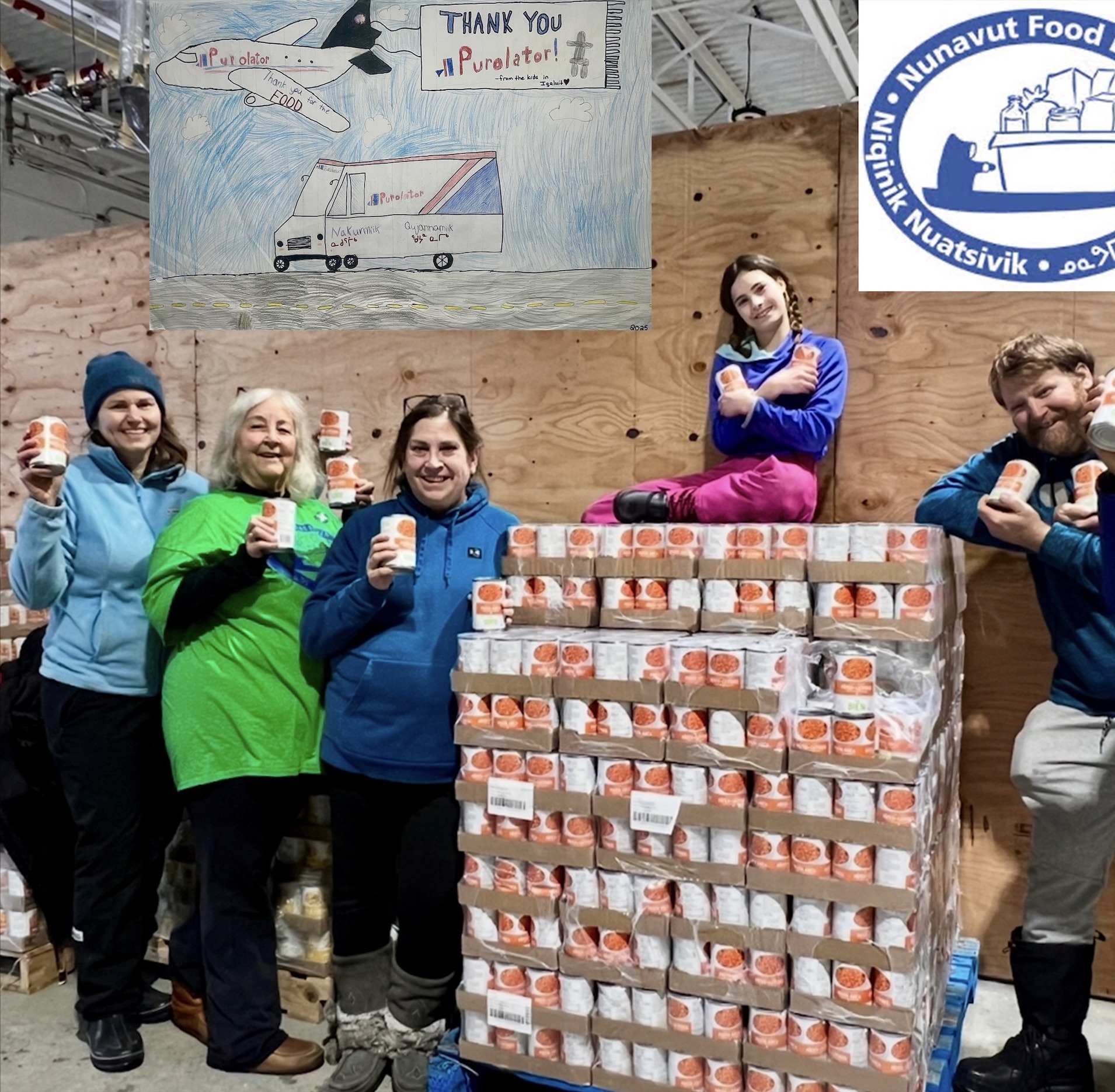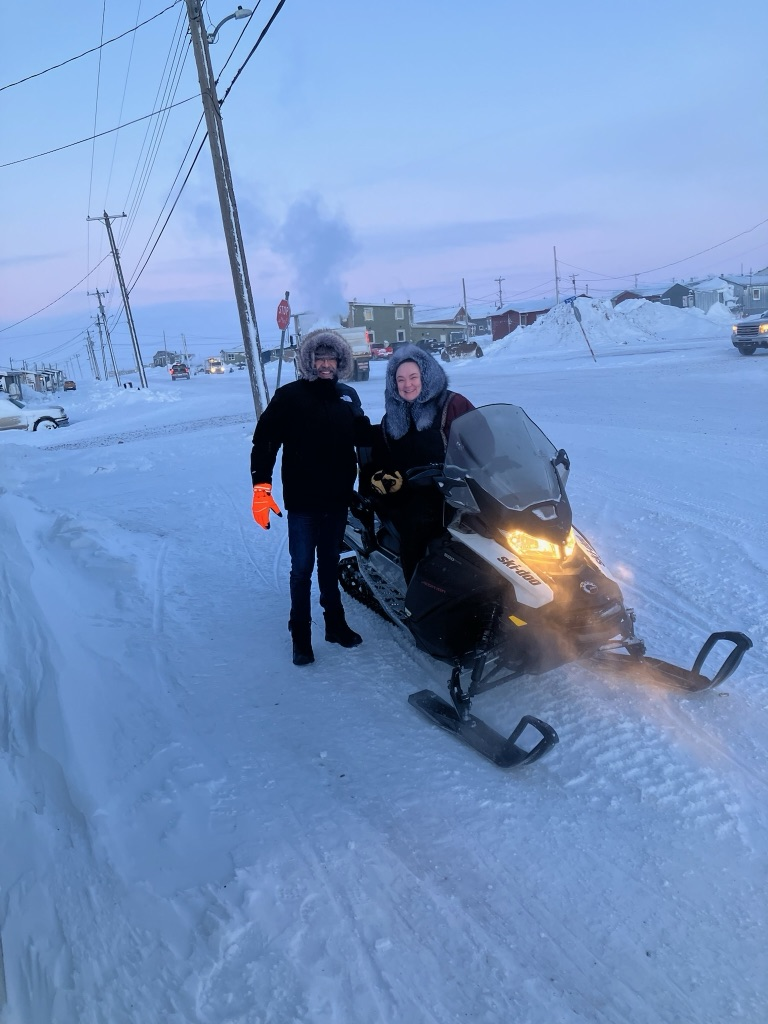Nearly half the clients served by the Niqinik Nuatsivik Nunavut Food Bank (NNNFB) in Iqaluit are under the age of 18. Therefore, NNNFB aims to provide some food options that children tend to appreciate. One option is a product called “pasta shapes in sauce” from the For Good Foundation, a Food Banks Canada partner that works with manufacturers to get high-demand foods made for no profit or highly discounted rates.

When the NNNFB reached out to Food Banks Canada in the spring of 2025 to request a new pallet of this popular food, our logistics team really wanted to make it happen. However, Iqaluit isn’t directly accessible by road from the south, and cargo ships weren’t feasible at that time of the year due to sea ice.
“With their help, we coordinated an air cargo shipment into Iqaluit,” says Mark LeBlanc, distribution and logistics manager at Food Banks Canada. “For context, [paying for transportation] would have cost three times the food purchase itself! We’re very grateful to Purolator. This gift-in-kind of their services was part of an ongoing partnership that we’re fortunate to have with them.”
Delivery by airplane was theoretically possible but very expensive. Thankfully, Food Banks Canada has logistics partners that donate their services or give us special rates. In this case, Purolator transported the pallet to Iqaluit free of charge.
Taking On Shipping Challenges
People living in the North are disproportionately affected by food insecurity. Communities contend with the effects of past and present inequities, a lack of employment opportunities and sky-high food costs. With climate change putting pressure on traditional food sources and systems, many communities need access to both locally harvested country food and affordable market food.
Shipping food to the North can present many obstacles, including varying ice road conditions, inclement weather, lack of infrastructure and cost of transportation. But Food Banks Canada and logistics partners such as Purolator are up to the challenge, because everyone in Canada deserves access to the food they need, regardless of geography. So far this year, from January to June 2025, we’ve worked together to distribute more than 235,000 pounds of food to Northern communities.
“We Don’t Feel Alone Anymore”
In addition to facilitating food shipments, Food Banks Canada’s Northern Program also aims to reduce food insecurity in Northern communities in the following ways:
- Supporting the Network of the North, a growing group of stakeholders who are working together on advancing Northern food security
- Funding what’s needed, such as infrastructure
- Advocating for systemic policy changes that address the root causes of food insecurity
Our Northern program staffers, Jay Stevens and Nolan Wadsworth Polkinghorne, help to build the relationships required to pursue these strategies. Last winter, for example, they visited Baker Lake, Nunavut, home to around 2,000 people. Their first port of call was the Abluqta Society, a local social enterprise that runs a food bank. Abluqta means “Let us step forward” in Inuktitut.
It was time for the Abluqta Society’s annual general meeting, and more than 60 highly engaged community members were in the room. Sensing their welcoming energy, Stevens and Polkinghorne presented Food Banks Canada as a potential partner in their efforts to improve food access in the region.
“When you’re making a connection, you ask people how they perceive food security from the community lens,” explains Stevens. “It’s up to each community what they want to do, and we’re there to support as we can.”

In Baker Lake this year, that looked like informing the Abluqta Society’s leadership about the latest Food Banks Canada grant opportunities and arranging advisory support for their applications. Stevens and Polkinghorne also connected the Abluqta Society with the Wiiche’iwaymagon Buying Alliance, a group of tribal councils, Indigenous organizations and food banks that negotiate together for lower prices on food and food-harvesting equipment.
“A week or so later, they started attending the Wiiche’iwaymagon meetings, and eventually they signed on as a new member,” says Polkinghorne. “That will give them more buying power for food, as well as access to 25 food staple items coming into the community regularly.”
However, a couple of months later in March 2025, black mold was found in the building that had been hosting the Abluqta Society, forcing it to search for a new site. That’s easier said than done in small Northern communities, where there’s not a lot of vacant space and where erecting new buildings is incredibly expensive.
In the meantime, Abluqta’s food bankers are doing as much as they can without their own space, such as distributing food vouchers to elders. As they navigate this crisis, their connections to Food Banks Canada, its Northern Program partners and Wiiche’iwaymagon will give them a larger support network.
“A lot of food banks and community organizations in the North feel they’re alone in what they’re doing in their respective regions,” says Stevens. “We connect them, and that helps keep the momentum going. When we visit, they often say something like, ‘Someone heard us. Someone is going to be a partner in addressing food insecurity issues. We don’t feel alone anymore.’”